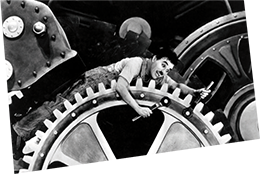
Modern Times
by Charlie Chaplin
USA - 1936
Sunday, June 2th • 2PMThursday, June 6th • 9AMAt Chaktomuk

|
Modern Times by Charlie Chaplin USA - 1936 |
Sunday, June 2th • 2PMThursday, June 6th • 9AMAt Chaktomuk |
|
Feature Film - 87mn B&W
Silent Movie ScreenplayCharlie Chaplin CinematographyIra H. Morgan and Roland Totheroh MusicCharlie Chaplin CastCharlie Chaplin, Paulette Goddard, Henry Bergman, Stanley Sandford, Chester Conklin Format35mm – Mono GenreComedy First ReleaseFebruary 5, 1936 Restored Version2010 ProductionCharlie Chaplin - United Artists 
|
Selective filmography of Charlie Chaplin(1889-1977) 1921 – The kid 1931 – City lights 1936 – Modern Times 1940 – The great dictator 1952 – Limelight 1958 – A king in New York With the courtesy ofMK2 and Association Chaplin |
||

|
|||